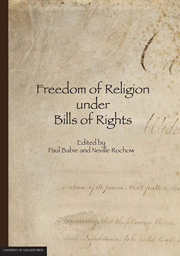Book contents
- Frontmatter
- Contents
- Acknowledgments
- List of Contributors
- Foreword by The Hon Sir Anthony Mason AC KBE: Human Rights and Courts
- INTRODUCTION
- SETTING THE SCENE
- CONTEMPORARY FREEDOM OF RELIGION ISSUES
- COMPARATIVE EXPERIENCE WITH FREEDOM OF RELIGION
- 9 Political Culture and Freedom of Conscience: A Case Study of Austria
- 10 The Sky is Falling if Judges Decide Religious Controversies! – Or is it? The German Experience of Religious Freedom Under a Bill of Rights
- 11 Religious Freedom in a Secular Society: The Case of the Islamic Headscarf in France
- 12 Religious Freedom in the UK after the Human Rights Act 1998
- 13 Judicial Interpretation, Neutrality and the US Bill of Rights
- 14 Protecting Religious Freedom: Two Counterintuitive Dialectics in US Free Exercise Jurisprudence
- 15 Walking the Tightrope: The Struggle of Canadian Courts to Define Freedom of Religion under the Canadian Charter of Rights and Freedoms
- 16 Quo Vadis The Free Exercise of Religion? The Diminishment of Student Religious Expression in US Public Schools
- 17 Freedom from Discrimination on the Basis of Religion
- 18 Ruminations from the Shaky Isles on Religious Freedom in the Bill of Rights Era
- 19 Indigenous Peoples and Bills of Rights
- TABLE OF LEGISLATION AND INTERNATIONAL INSTRUMENTS
- INDEX
19 - Indigenous Peoples and Bills of Rights
from COMPARATIVE EXPERIENCE WITH FREEDOM OF RELIGION
Published online by Cambridge University Press: 05 June 2013
- Frontmatter
- Contents
- Acknowledgments
- List of Contributors
- Foreword by The Hon Sir Anthony Mason AC KBE: Human Rights and Courts
- INTRODUCTION
- SETTING THE SCENE
- CONTEMPORARY FREEDOM OF RELIGION ISSUES
- COMPARATIVE EXPERIENCE WITH FREEDOM OF RELIGION
- 9 Political Culture and Freedom of Conscience: A Case Study of Austria
- 10 The Sky is Falling if Judges Decide Religious Controversies! – Or is it? The German Experience of Religious Freedom Under a Bill of Rights
- 11 Religious Freedom in a Secular Society: The Case of the Islamic Headscarf in France
- 12 Religious Freedom in the UK after the Human Rights Act 1998
- 13 Judicial Interpretation, Neutrality and the US Bill of Rights
- 14 Protecting Religious Freedom: Two Counterintuitive Dialectics in US Free Exercise Jurisprudence
- 15 Walking the Tightrope: The Struggle of Canadian Courts to Define Freedom of Religion under the Canadian Charter of Rights and Freedoms
- 16 Quo Vadis The Free Exercise of Religion? The Diminishment of Student Religious Expression in US Public Schools
- 17 Freedom from Discrimination on the Basis of Religion
- 18 Ruminations from the Shaky Isles on Religious Freedom in the Bill of Rights Era
- 19 Indigenous Peoples and Bills of Rights
- TABLE OF LEGISLATION AND INTERNATIONAL INSTRUMENTS
- INDEX
Summary
Proponents of a bill of rights — whether of the constitutional or statutory type — will usually have a vision of what bills of rights can accomplish. Indeed, there may be competing visions. Some will see a bill of rights as affirming a core set of civil and political rights against the possibility of future erosion — essentially ‘process’ rights such as liberty and speech without which a democracy cannot flourish. Others may seek to include new rights that, as they see it, have not been so well reflected in the legal system, or at least not seen as within the province of judges to rule upon. For them, a bill of rights will be designed to transform targeted areas of law and policy, not just to affirm and protect the existing order. Social and economic rights, for example, may be advocated. The aim will be to set new standards to which the state can be held to account.
For countries with Indigenous peoples, the idea of Indigenous peoples' rights will assuredly be on the agenda when a bill of rights is mooted. But are these part of the core civil rights, or are they new and developing? Are they affirmatory or aspirational? Is it enough that every person, including every Indigenous person, enjoys the basic rights of participation essential to democracy? Or are there particular rights to which Indigenous peoples are entitled, rights that protect the vitality and autonomy of their group, their worldview, their way of life, and set a new standard against which a state's laws and actions may be measured and, perhaps, found wanting?
- Type
- Chapter
- Information
- Freedom of Religion under Bills of Rights , pp. 393 - 421Publisher: The University of Adelaide PressPrint publication year: 2012



